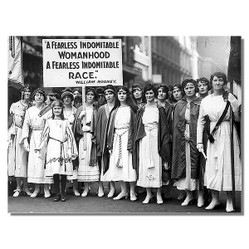By all intents and purposes, the emergence of the internet created a space for women to freely publish their art and share their experiences without banging their heads on the glass ceiling.
The internet offered, not only a platform for women writers and other artists, but anonymity- should it be required.
Initially, although not necessarily by design, the freedom to publish on the world wide web began to tip the scales of the social arrangement. Not only did women bloggers, artists, journalists and scholars have a platform from which to freely share their experiences and opinions; but women outside of the public sphere were able to engage in the discussion, too.
The inclusive nature of publishing and commenting on the internet appeared to render the somewhat nuanced and westernised forms of woman silencing null and void. Womens voices were becoming louder; they could no longer be ignored.
And whilst the anonymity of the internet empowered many women from the around the world, unfortunately, it also invited some deeply embedded misogynistic strategies to silence; insults, intimidation and threats.
These tactics are as old as the hills. Frequently used, not just when women present a strong and credible argument and not just when women ask men uncomfortable questions which may or may not be related to gender arrangements, but just because a woman has dared to speak.
This form of gender based censorship generally follows a well established pattern. The aggressor will attempt to dehumanize; a woman who resembles an animal is too ugly to be taken seriously; she is stupid, demonise, discredit and finally silence. He will also present himself as virtuous in comparison to his female opponent, he will remind her of her place in relation to his.
In the video below, David Starkey, a rather controversial British Historian, is accused by Laurie Penny, a well known British journalist and blogger who writes from a feminist and left leaning perspective, of playing Xenophobia and national prejudices for laughs. The debate focuses on Britishness and what it means to be British. Note his reaction.











 A Colorful Journey: Comparing and Contrasting Mexican Folk Art With Polish Folk Arton 09/05/2024
A Colorful Journey: Comparing and Contrasting Mexican Folk Art With Polish Folk Arton 09/05/2024
 Exploring Traditional Japanese Tapestry Landscape Art: A Window into Nature’s Serenityon 09/01/2024
Exploring Traditional Japanese Tapestry Landscape Art: A Window into Nature’s Serenityon 09/01/2024
 Are Border Collies Really the Smartest Dog Breed?on 08/20/2024
Are Border Collies Really the Smartest Dog Breed?on 08/20/2024
 A Writer's Guide To Wizzley- A Gem of A Bookon 04/10/2013
A Writer's Guide To Wizzley- A Gem of A Bookon 04/10/2013



Comments
Yes, I agree that the comment regarding her schooling was about class, as he compared her background with his own. However, he also referred to her as a 'girl' which is demeaning in itself, particularly when he addressing a woman, not a girl.
The UK still has a fairly strong class system and the comment 'jumped up public school girl' is not about gender, it is about class. The implication is that because she went to public school, she is from a privileged background and therefore has no understanding of the 'real' world. It is fairly common to see references to David Cameron and George Osborne being 'public school boys' making precisely the same point.
I agree that calling people out in the moment can be an effective to way to hear all voices. Unfortunately however, this simply doesn't happen enough and there are good reasons for that. Many men have also been silenced when they attempt to speak out on behalf of women who have been censored. :)
Apologies for the slow reply, I really agree with what you wrote, HollieT, that people who dismiss women's perspectives (or perspectives of any one group) are more likely to dismiss other people on the basis of not being part of some group as well (race, religion, political identity, age, etc.). That fits with my experience.
I try not to speculate as to why people are dismissive--often I think people (especially men) are not conscious of it, but if you try to draw attention to it in general (like saying: "I notice you seem to be dismissive of what women say in meetings.") I've found it often elicits a defensive reaction. Instead I think it's most helpful to call people out on it immediately--right as it is happening. For example, if a man interrupts a woman who is making thoughtful comments, interrupt the man and say: "Hey, please let so-and-so finish her point. I think her perspective is valuable and I want to know what she has to say."
It can be hard to speak up in the moment, but I've found that this is the time when it's most likely to actually get through to someone that what they're doing is harmful and unwanted. My experience with people suggests that people usually selectively remember what happens in conversations and meetings, and if someone is being dismissive of or disrespectful of women, they often don't even remember the specifics of what the woman was saying, because they were ignoring the women or not focusing on her perspective.
I also think calling people out in the moment can send a strong message to everyone present, that everyone's perspective is important, and that people don't tolerate the sort of dynamic in which louder or more aggressive people dominate a conversation.
You're absolutely right, we do need a media revolution- And I'm optimistic that that will happen. I have every faith in the generations which are coming up behind me- they're the future editors, producers, directors and more. :)
Hi Bethany,
Thank you! :) I do believe that many of the younger generation are exposed to such tactics more frequently than I was when I was younger because of the internet. And awareness definitely helps when it comes to opposing any form of sexism or censorship. :)
Hi Morgan,
Even though I know that this exists it still shocks me too. I can well imagine how women in the video game industry are shut down when they attempt to develop strong and independent female characters. I find it staggering that in this day and age there are those who still feel so threatened by such a scenario.
I was reading a blog a few weeks ago where the author had a piece he'd written in support of a feminist rejected by his editor (in his day job). The first piece he had ever had rejected! He later wrote other pieces declaring that he was a feminist and attempting to discuss issues such as gender based censorship. All the pieces were rejected and he later resigned. You're absolutely right, so many negative connotations have been attached to the word feminist that many women will actually say "I'm not a feminist but" As as if that declaration needs to be made before any form of criticism or dissent is voiced.
Thanks for stopping by.
Hi Jo,
Thank You, I'm really glad you stopped by. We've no doubt come across many women who've encountered this form of censorship- the good thing is that they're still writing though! :)
A male friend of mine and I have fairly frequent discussions on this, particularly in regards to forms of media that are generally thought of as masculine. I've heard a lot of horror stories about the kinds of things said to female video game developers, or comic authors, and it really baffles me how things like this still exist.
It extends further into the stifling of a female presence in media. Phrases like, "Nobody wants to play a game starring a strong woman," are horrifyingly common. And God help a woman who tries to complain! "Feminist" has gained almost insult status, and it's thrown around apmost every time a woman presents a dissenting opinion. Possibly even more surprising is that men who try to speak up for women are just as quickly discredited! It's just sad.
Very, very well said!